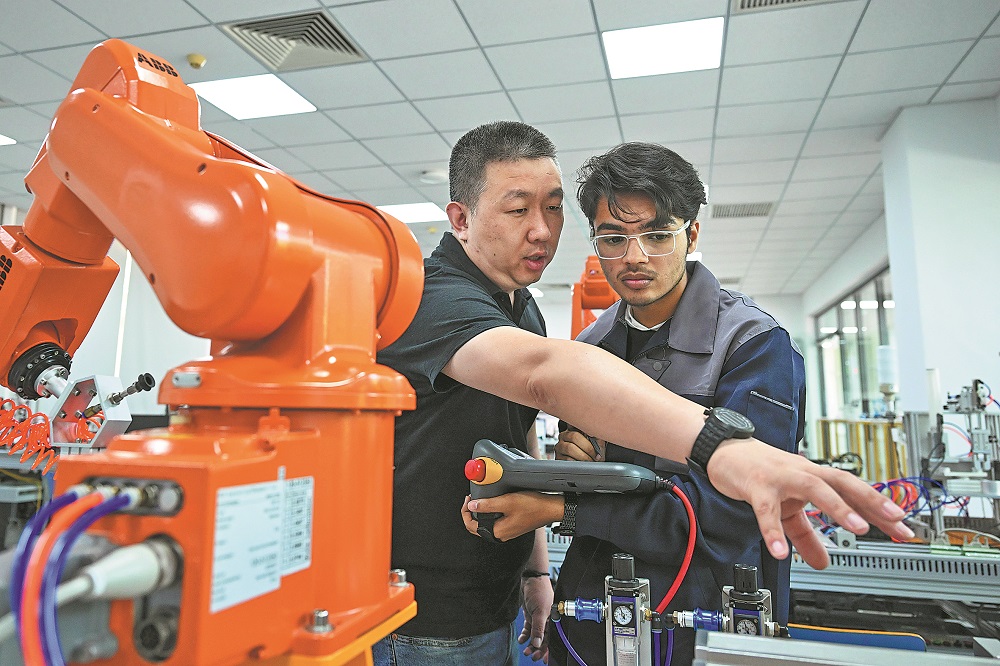Training helps to empower Global South
Over 500,000 professionals have gained skills from China's programs


When Joseph Njane, a railway training officer from Kenya, boarded for the first time a high-speed train from Beijing to Wuhan and then Guangzhou, he was captivated by the speed, safety and technological sophistication of the country's railway network.
The three-week training session in 2019, provided by Beijing Jiaotong University, allowed Njane, who works for Afristar, the company that operates the Mombasa-Nairobi Standard Gauge Railway, to learn about China's scientific approach to railway planning and construction, control and monitoring systems.
"Seeing China's railway network firsthand was really eye-opening," he said, adding that the field trip ignited his desire to bring the advanced technology back to help modernize Kenya's railway systems.
"The knowledge that I acquired, the scientific methods and models, can be used for our railways in Africa to improve the capacity and utilization of our lines."
Three years later, Njane participated in an online course also provided by the Beijing Jiaotong University, which he said enhanced his understanding of railway systems, from the structure of the railroad to dispatching technologies.
The most valuable takeaway of the training was China's emphasis on integrating technology with education, he said.
"The two training courses enabled and inspired me to come up with something that can be used in Kenya to train our staff and ensure their access to railway knowledge."
When he returned to Kenya, Njane established an online system where he uploaded the training materials from his visits to China and online training.
Now, any employee can log in and access those training materials within minutes, even though they did not get a chance to study in China, Njane said. "This accelerates technology transfer from Chinese experts to Kenyan workers."
The type of training that Njane received, as part of China's international human resources development cooperation, is seen as an important aspect of the country's foreign aid.
Over the past 70 years, China has carried out nearly 15,000 training programs for over 180 countries and organizations through various forms such as short- and medium-term training programs in China, overseas expert consultations and youth volunteer services.
These programs have covered 17 fields and trained more than 500,000 professionals in total, according to Li Ming, a spokesman for the China International Development Cooperation Agency.
China's foreign aid training programs focus on cultivating and enhancing the recipient countries' self-development capabilities, playing a vital role in international economic and technological exchanges and cooperation, he said.
Li shared examples such as a Rwandan trainee who founded a Juncao production company upon returning home, after learning about Juncao (mushroom and grass) technology in China, thereby helping to lift over 50,000 local farmers out of poverty.
An Iraqi trainee brought back China's "checkerboard" sand control method to combat desertification in Iraq, Li said, adding that another trainee from Afghanistan used emergency response training to prevent an explosion in Kabul.
The agency plans to launch over 2,000 training programs for more than 50,000 participants in 2025, he said, adding that China will continue to design development cooperation projects and provide 100,000 training and study opportunities to Global South countries over the next five years.
Two-way exchange
Jing Guoqing, a professor at the highway and railway engineering department of Beijing Jiaotong University, said that sharing China's railway development philosophy and experience allows participants to share insights into their countries' railway challenges and expectations.
"Teaching is a two-way process," Jing said. During the training, the trainees share their experiences, concerns, questions and aspirations, and such feedback is valuable for Chinese companies operating overseas, helping them to navigate cultural differences and improve their projects, he said.
"Foreign aid training plays a crucial role in bridging Chinese enterprises and international stakeholders, ensuring smoother cooperation," Jing said.
Such training helps to enhance local engineers and officials' understanding of China's technical expertise and project management approaches, he said, adding that as the locals become more familiar with Chinese standards, they trust Chinese companies more and feel more confident in adopting those standards.
"In this way, it will help China to promote its technology and standards overseas," he added.
Jing said that China should focus more on vocational training such as railway technology, new energy vehicle-related skills and photovoltaic installation, areas that will efficiently boost local development while fostering long-term partnerships with developing countries.
Knowledge transfer
Liu Xian, a research associate at the Institute of International Development Cooperation at the Chinese Academy of International Trade and Economic Cooperation of the Ministry of Commerce, said that the fundamental mission of human resource development cooperation is to "teach people how to fish" rather than mechanically export China's model.
"It is about unreservedly sharing China's experience and technology, enabling partners to grasp not only the 'how' but also the 'why' of the country's development practices through interaction," Liu said.
Stephen Ndegwa, executive director of South-South Dialogues, a Nairobi-based development communication think tank, said that by providing actionable knowledge, recipient nations will be able to adapt Chinese methods to their unique contexts, focusing on long-term planning and development models.
Ndegwa said that the impact of China's training programs is evident in their ability to strengthen development capacity and promote modernization in recipient nations.
Through skill development, policy learning and South-South cooperation, these programs equip participants with the tools needed to enhance local industries, improve productivity and develop homegrown policies inspired by China's success, Ndegwa said.
He noted that lessons from China's experience, such as prioritizing public investment in critical sectors, offer valuable insights for African countries seeking to balance tradition with innovation while pursuing their development goals.
As the Global South pursues its modernization journey, cooperation with China is expected to focus on inclusive growth, technology-driven development, and resilient infrastructure, he added.
Ndegwa stressed that China's approach to foreign aid training is practical and results-oriented.
The training programs emphasize respect for sovereignty and noninterference in domestic affairs, offering flexible knowledge that countries can adapt to their own governance structures, he said.
Participants often highlight the focus on tangible outcomes, such as improved infrastructure and poverty reduction, he added.
According to a survey regarding China's foreign aid training by the Institute of International Development Cooperation at the Chinese Academy of International Trade and Economic Cooperation, which was conducted among over 1,400 participants from 32 countries and regions, 75.89 percent of participants believed the training significantly improved their professional knowledge or skills.
The survey found that 75.23 percent of participants feel that the training greatly enhanced their career competitiveness, while 75.38 percent find the experiences gained in China highly applicable in their home countries.

































